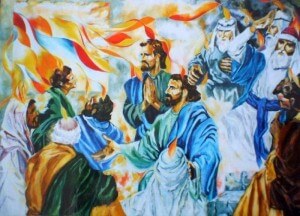Orphans’ Sunday. That is what the Sunday before Pentecost is called in the Dutch Reformed tradition. This is because it is stuck in between Ascension day and Pentecost. For a short time it seemed that the disciples had been left like orphans.

Jan de Bray – Tending Children in the Orphanage in Haarlem
Coincidence or not, one or two days after Orphans’ Sunday our congregation would receive the sad news of Fr. Rik’s resignation as our chaplain. Orphans’ Sunday. A very incorrect name also. Because Jesus had promised NOT to leave his disciples like orphans, but to provide for a miraculous successor.
And today we celebrate the arrival of this mysterious divine power. In the period from Holy Week to Whit-sun we have been on a kind of roller-coaster of emotions. If we have connected to the events that were remembered in our liturgy, that is. I don’t know about you, but so far this liturgical year has challenged me more than usual. Two weeks ago I went through a second Good Friday service in a Greek Orthodox church. It was a mixture of extreme reverence, intimacy and sadness on the one hand and great gratitude and joy on the other hand. Bittersweet like many things in life. But let us take one step back and look at the bigger picture.
Both Judaism and Christianity have three great annual feasts. The Jewish people particularly celebrate Passover, Pentecost and the Feast of Tabernacles. Christians particularly celebrate Passover, Christmas and Pentecost. Passover is the most important feast in both religions, and there is much common symbolism. Pentecost is the other feast we both celebrate, although the similarities are less obvious. There are many traditions surrounding Pentecost or Whitsun in various countries, but today I would like us to look at the origins of the feast and how Pentecost can function in our daily life.
 First we should realize that Pentecost started as a joyful harvest festival. The people were still to remember their escape from Egypt, but no bloody sacrifice was required at this feast. This pointed forward to the fact that Christ’s sacrifice would not have to be repeated. It would be a once and for all liberation after which we would only have to accept the victory, the peace and the power of that Easter event, bearing the fruits of His new life.
First we should realize that Pentecost started as a joyful harvest festival. The people were still to remember their escape from Egypt, but no bloody sacrifice was required at this feast. This pointed forward to the fact that Christ’s sacrifice would not have to be repeated. It would be a once and for all liberation after which we would only have to accept the victory, the peace and the power of that Easter event, bearing the fruits of His new life.
Secondly, looking at Pentecost as a harvest festival may also change the way we look at the church. Normally Pentecost is seen as the birthday of the church, and certainly as the start of its rapid growth. Now this is certainly one way of looking at it, and the Holy Spirit is definitely needed to make the church grow. We simply cannot do this on our own, by whatever PR, technical means or determination. But we can also look at Pentecost as the fulfilment of an organic process, a harvest of the heart. Let me explain this a bit further.
Just as Jesus himself appeared, as the Scriptures say, in the fullness of time, so He predicted that the Holy Spirit would be poured out at Pentecost. No particular time was mentioned, but it was clearly a future event. “I will ask the Father, and he will give you another Advocate, to be with you forever. 17 This is the Spirit of truth, whom the world cannot receive, because it neither sees him nor knows him. You know him, because he abides with you, and he will be in you.”
But a short time of confusion and preparation necessarily preceded Pentecost.
Note also that Pentecost did not so much produce unity, but that the unity was already there. “When the day of Pentecost had come, they were all together in one place”.
They were united by their common helplessness, and this is perhaps something we too, must first feel and admit, and really wait for Christ, for the Holy Spirit, to come to our aid.
And then, in the fullness of time, we will receive the miraculous answer within ourselves.
Now although Christ said that the Spirit of truth would always stay with us, this experience can always be renewed and intensified, just like the harvest comes back every year.
As the Psalm for today says in verse 30: “When you send forth your spirit, they are created; and you renew the face of the ground.” We should remember that the Spirit of God is life and energy itself and the whole universe depends on God to maintain it.
Frequently the controversy between Darwinism and the Bible focuses on the question, Did God create man, or did man arrive through some other mechanism? But God’s creative activity is not limited to the past. His activity has not stopped.
John 5:17 “My father is still working.”
Philippians 2:13 “For it is God who works in you both to will and to do his good pleasure.”
2 Corinthians 5:17 “Therefore if any man be in Christ, he is a new creature.”
But then, what exactly is new about Pentecost? Well, the disciples did not know what happened to them, either. All they realized was that this was something from above, something divine. They were suddenly able to speak in all these languages, reaching thousands with the gospel. Just as they had recognized God in Jesus, so they recognized God in these tongues. This would later lead to giving the Holy Spirit its own place within the Trinity. Our creed would probably not have been Trinitarian if it had not been for Pentecost.
This in itself underlines the great importance of the feast we celebrate today.
 But how does that relate to us in 2013? First we should notice that many names are used for the same thing. Acts speaks of the Holy Spirit, Jesus speaks of another Advocate or Comforter, paracletos in Greek, about the Spirit of truth and about the Holy Spirit. In verse 6 it becomes clear that the Spirit of truth is the Holy Spirit.
But how does that relate to us in 2013? First we should notice that many names are used for the same thing. Acts speaks of the Holy Spirit, Jesus speaks of another Advocate or Comforter, paracletos in Greek, about the Spirit of truth and about the Holy Spirit. In verse 6 it becomes clear that the Spirit of truth is the Holy Spirit.
And in the letter to the Romans, there is mention of a spirit of adoption.
The question is, does that spirit, that has many names, replace our own spirit or life force?
When we read Galations 2:20, that seems to be the case. The New living translation says,
“My old self has been crucified with Christ. It is no longer I who live, but Christ lives in me”.
But there are other indications that the two spirits can live side by side. In our reading from Romans it says that the spirit of adoption bears witness with our spirit that we are children of God. So if something has died, it is not our spirit or self, but our ego.
The next question is, how can we receive that spirit of truth, the comforter? Tradition has it, that we receive it at baptism, just as the Holy Spirit descended on Jesus at baptism in the form of a dove. Whereas Jesus had always been God’s beloved Son, we are adopted at baptism. Then like Jesus, we can address God as our Father, and will inherit the kingdom with Christ. There is a curious story in Acts 19 where Paul meets a group of 12 believers in Ephesus, who have been baptised, but had not received the Holy Spirit, and had not even heard of the Holy Spirit. Although the text doesn’t specifically say this, it is assumed that these people believed in the Messiah. They received some further instruction, we don’t know exactly how much, and received a proper baptism. When Paul laid hands on them, they received the Holy Spirit. Here we see that receiving the Holy Spirit has something to do with knowledge. It has also something to do with joining those who have already received the Holy Spirit, i.e. the main body of the church.
But there is more to it. Jesus said: “I will ask the Father, and he will give you another Advocate, to be with you forever.” He did not say, I will send the Holy Spirit, as if the Holy Spirit proceeded from Him, like it says in our creed, but he said: I will ask the Father. The reception of the Spirit, then, is a matter of grace. Ultimately there is nothing in particular that we can do to force the Spirit down. Even Jesus humbly asked for it, although He knew that the Father would hear his prayer.
Then he explained: “This is the Spirit of truth, whom the world cannot receive, because it neither sees him nor knows him. You know him, because he abides with you, and he will be in you.” Note that he speaks both in the present and in the future. The disciples knew the truth because the spirit of truth abided with them. But the spirit of truth was not yet inside them. That would happen at Pentecost. Likewise we may have a kind of knowledge that the world cannot receive, but that knowledge may not yet be alive. Strictly speaking, truth is not even the same as knowledge. Truth gives meaning and coherence to the way we see the world. Truth cannot survive outside the heart for long. Our society has a distorted idea of truth because it deals primarily with data, information, knowledge, the mind and control. Too much focus on knowledge may hinder the perception of truth, because it prevents us from seeing the big picture, the unity of all things and the love of God that sustains the world.
This brings me to one final aspect of Jewish Pentecost that has not yet been mentioned.
In Judaism, Pentecost was also the celebration of the giving of the law on mount Sinai.
In fact, the Torah became the central pillar of Judaism and still determines its identity.
Likewise, the spiritual law of Christ, that is written in the heart of the true Christian,
is an important part of the identity of the people of God under the new covenant.
Together with our salvation in Christ, there is really nothing more characteristic of a disciple. Everything else is either a consequence or an imitation of the spirit.
Just like Jesus said the Father was in Him and He in the Father, a mutual indwelling,
so the spirit that was in Christ is meant to live in us and we in the Spirit.
In Ephesians 4:30 we are told not to grieve the spirit by which we are sealed until the day of redemption.
During our monthly healing services, which I would warmly recommend to you, we ask that the Lord will fill the heart and soul, the mind and body of each person. And we believe that we and the ones we pray for, receive a special blessing.
I would like to end where most sermons and articles about Pentecost start. The fact that the spirit helps us to reach different audiences. It is true that the disciples in the book of Acts can be compared to our different churches of today. Each church has its own language and symbolism and music and missionary approach. But if we interpret the story of Pentecost only in that way, we are forgetting one important thing. Pentecost enabled the primitive church to do what they could not do before. Each individual believer reached an audience because they were personally enriched, whether they were apostles or common disciples.
Again, this is not something we can achieve entirely by ourselves. Perhaps we should even stop trying. But let us pray for the grace of receiving that spirit anew. That spirit that can energize us, comfort us, heal us, further unite us, bring reconciliation, strength, peace and wisdom. Then, in the fullness of time, that prayer is sure to be answered and we will have another harvest time.
Amen.





Leave A Comment